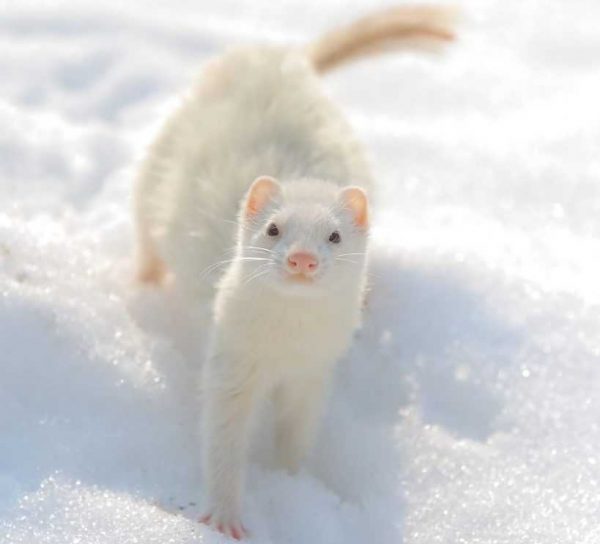If you’re the owner of a ferret, and you’re noticing changes in its coat color, then you will learn below all the reasons why that might happen. And yes, some ferrets do turn white during the winter season, or to be more precise they will do it in preparation for it, as they’re shedding during fall.
Along with the shedding process that turns their coat lighter, there are also other possibilities, such as aging, disease, or a change in diet. We’ll explain it all below.
Do Ferrets Turn White in Winter?

Yes, ferrets can turn white in winter. It will happen in fall actually, as they’re shedding and preparing their coat for the winter season. It will be of a lighter shade and longer, to provide them with warmth and to help them blend it a bit better in snow.
While they can have a fur coat of a lighter shade, that doesn’t mean that they all turn all the way white. There are over two dozen different types of ferrets, and each has its own particularities.
Why Do Ferrets Change Colors? 6 Possible Reasons
Having a ferret’s coat change colors can be normal, but it depends. Below you can read about a few possible reasons, why that might happen, and what you can expect in each case.
It’s Part Of The Aging Process
As the ferret is born, the initial color will be grey, but then in the coming months it will slowly change to the one they’re going to have as adults. As such, you might see a baby ferret slowly changing its colour into white, if it’s an Albino ferret.
Another potential time when a ferret could turn white as it’s aging, is if it’s a Silver Ferret. Eventually, as the Silver Ferret becomes older, it will end up with completely white fur.
Shedding Before Summer or Winter
Shedding its fur, the ferret will adjust so that it can better deal with the coming seasons. The winter coat is going to be longer and better suited to keep him warm. The summer coat will be shorter.
During the shedding process, the fur can become lighter in shade, thanks to the oils which are secreted at the time. As such, it might appear that they become white, at least compared with the type of coat that they’re sporting the rest of the year.
You Changed Its Diet
A major reason why the ferret’s coat might turn white, from yellow, is when you’re changing its diet. If it was initially fed kibble, and you’re switching to raw meat and eggs, then you will notice this change of color, and it will become a white ferret.
Waardenburg’s Syndrome
As I’ve also mentioned below, a white-colored coat could mean that the ferret suffers from this syndrome, which makes ferrets go deaf. You can usually tell by the presence of the white stripe on its head, along with the blue eyes and white paws.
Hormonal Secretions
Male ferrets will change colors to a lighter shade, going towards the yellow side, when they’re in breeding season. The hormonal changes that they’re going through at the time will be the cause.
Adrenal Gland Disease
This is another time when a ferret’s coat will turn more towards yellow/lighter shade. The hormonal imbalance will provoke an increased secretion of sebum, and the subsequent change in coat color.
When Is a White Colored Coat A Danger Sign
While generally it’s not unusual for a ferret to become white, particularly in the situations we’ve outlined above, there are also cases when it’s something to worry about. If the ferret has an unusual behavior, or if he shows other physical signs.
The first situation is when the change in its fur coat is accompanied by behavioaral issues. You might notice that it’s not eating very well, that it’s becoming aggressive, or that it just looks unwell. If that’s the case, then it could be a hormonal issue, and it’s a good idea to check with a vet.
Second, there are certain signs which indicate the presence of Waardenburg’s Syndrome, which could mean that your ferret will become deaf. If the coat becomes white or grey, and at the same time he has blue eyes, white paws, along with a white stripe on its head, then you should visit a vet as soon as possible.
